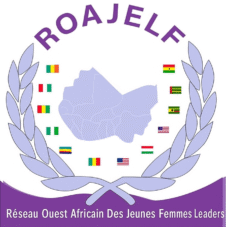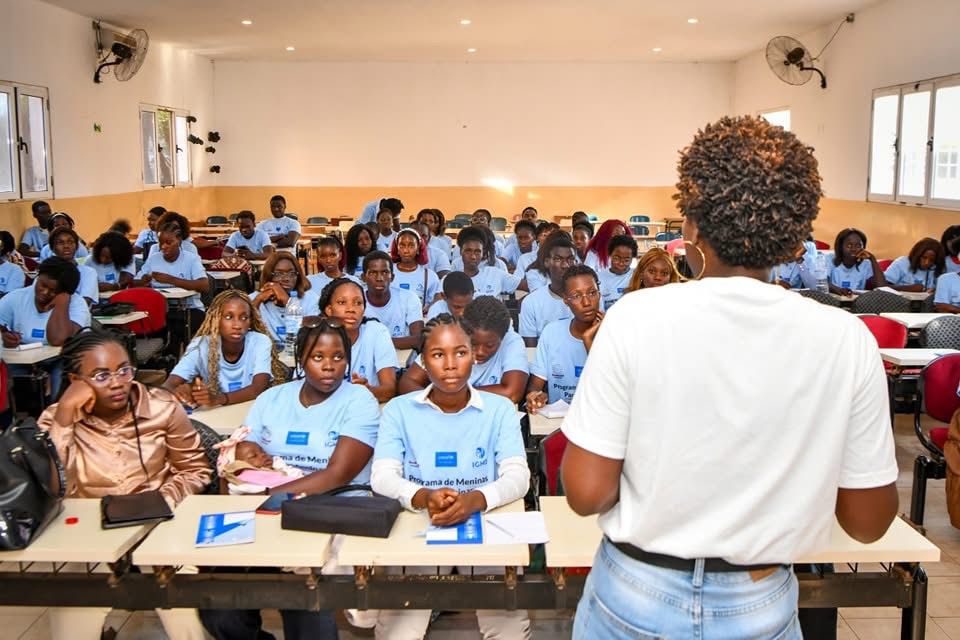ROAJELF Regional President’s Message
Between 2021 and 2025, the West African Network of Young Women Leaders (ROAJELF) stood as a living testament to the transformative power of young women’s solidarity and youth leadership in advancing the ECOWAS vision of peace, stability, and inclusive development. These years have been a defining chapter in our collective journey; one that tested our resilience, strengthened our unity, and positioned young women at the heart of regional transformation.
While we were elected at a time when our region was marked by democratic fragility, economic uncertainty, and social transition, our leadership sought to move beyond rhetoric, translating feminist ideals into action. Through our collective advocacy and partnerships with ECOWAS, UN Women, UNOWAS, our partners, and sister networks, ROAJELF ensured that young women’s leadership became a strategic pillar in the implementation of the Women, Peace, and Security (WPS) and Youth, Peace, and Security (YPS) agendas across the ECOWAS space.
Our interventions — from the UN Women Executive Dialogue in 2022, to regional engagements in Niamey, Abuja, Bamako, and Dakar, to our joint advocacy on gender and financial integrity with GIABA and EGDC — have redefined the visibility and legitimacy of young women as peacebuilders, entrepreneurs, and political actors. ROAJELF did not simply participate; we shaped the agenda. We made the case that peace and economic governance must be gender-responsive, youth-inclusive, and grounded in human security.
Across all 15 ECOWAS member states, our chapters built bridges between generations of women leaders — training young women in leadership, digital advocacy, climate-smart agriculture, and political participation; supporting survivors of gender-based violence; and mobilizing rural women and girls as agents of change.
Across the fifteen ECOWAS member states, our national chapters have shown extraordinary creativity and resilience in translating regional commitments into transformative local action. In Liberia, we advanced the Women in Agriculture and Political Leadership Project, training over 300 women farmers, supporting 150 female candidates, and institutionalizing gender-sensitive budgeting with the Ministry of Finance — a model of inclusive economic governance. In Senegal, our sisters pioneered “Dakaal Metital” to combat gender-based violence in universities, reaching over 1,000 students, while also leading “Empo’Women”, a regional political empowerment program supported by ECOWAS and Spanish Cooperation. Benin took an eco-feminist leap with Biochar Production and Above-Ground Gardens, fostering women’s climate resilience and circular economy innovation. Mali established Girls’ Cafés in Ségou — dynamic civic spaces where young women engage policymakers to harmonize national laws with international gender treaties. Burkina Faso led a Regional Advocacy for Holistic Care for Survivors of GBV, influencing the adoption of key decrees under Law 061 on violence against women. In Guinea-Bissau, we institutionalized the National School for Young Female Leaders and the Girls for Girls Program, empowering over 500 adolescent girls annually in rural zones. Sierra Leone’s 50% for Her Too campaign mobilized digital feminist advocacy for gender parity and strengthened youth-led participation in peace and security coalitions. In Nigeria, the Her Voice, Her Power initiative used media as a platform to elevate indigenous women’s participation in governance, while The Gambia convened inclusive community dialogues on the ECOWAS Gender and Migration Framework, tackling irregular migration and uniting faith leaders against FGM. Finally, Côte d’Ivoire reinforced feminist leadership by integrating UNSCR 1325 and 2250 into youth networks through innovative capacity-building for CSOs all powerful illustrations that when young women lead, societies thrive, and our region moves closer to the equality and peace we envision.
This report is an account of activities and also a chronicle of a movement. It affirms that the young women’s transformative leadership future we envision for West Africa is not deferred; it is being built daily by courageous young women who dare to lead, organize, and transform their realities.
As Regional President, I am deeply grateful to the ECOWAS Commission, the ECOWAS Gender Development Centre, UN Women, UNOWAS, GIZ, our national Leadership, and every partner who believed in the leadership of young women. Together, we have nurtured a new generation of young women leaders who are not waiting to be invited to the table; they are building new tables where equality, peace, and justice are non-negotiable.
As we move toward 2025 and beyond, ROAJELF remains steadfast in its commitment to accelerate gender equality, strengthen democratic governance, and empower women and youth as co-architects of regional resilience. Our vision is clear: a West Africa where every young woman’s voice counts, her potential is realized, and her leadership shapes the destiny of our region.
In solidarity and service,
Miatta Garmai Darwolor
Regional President, West African Network of Young Women Leaders (ROAJELF)
ECOWAS Region

